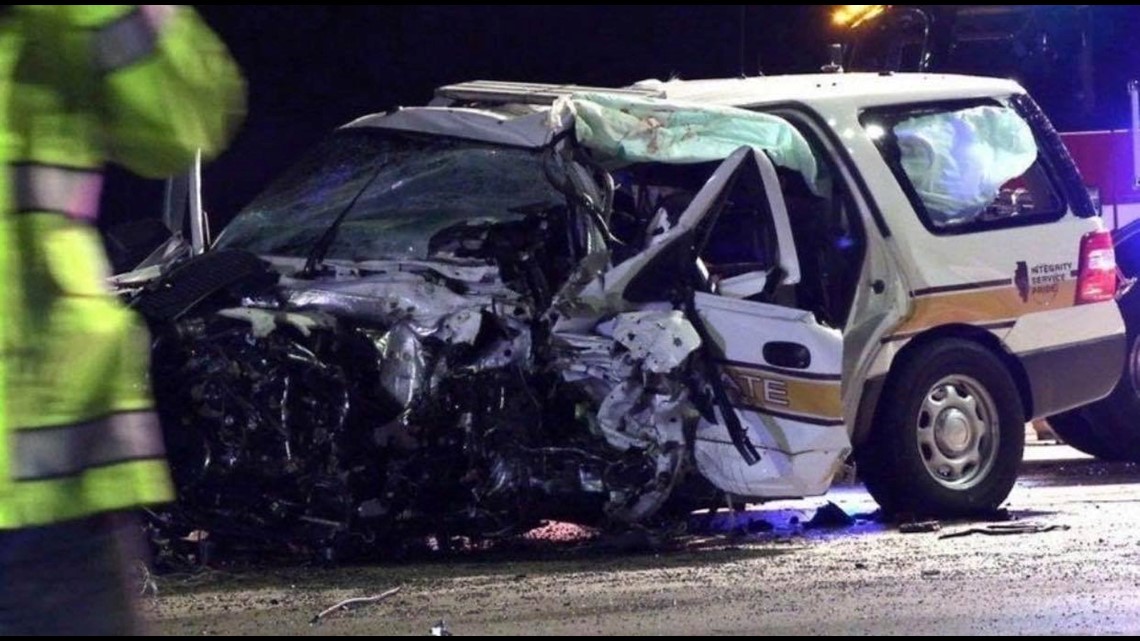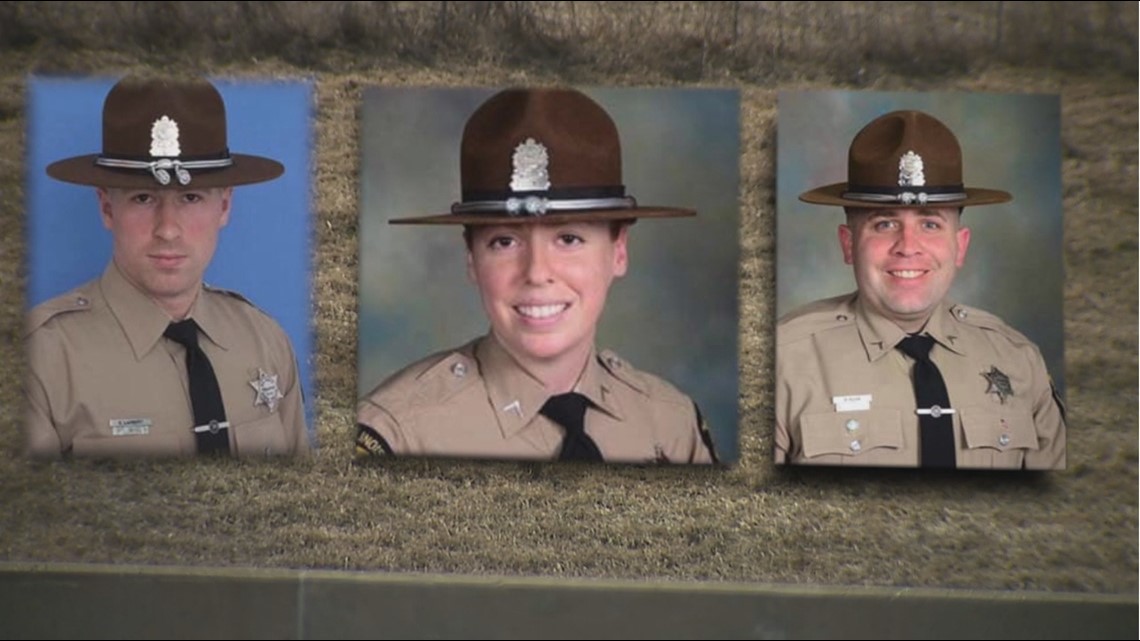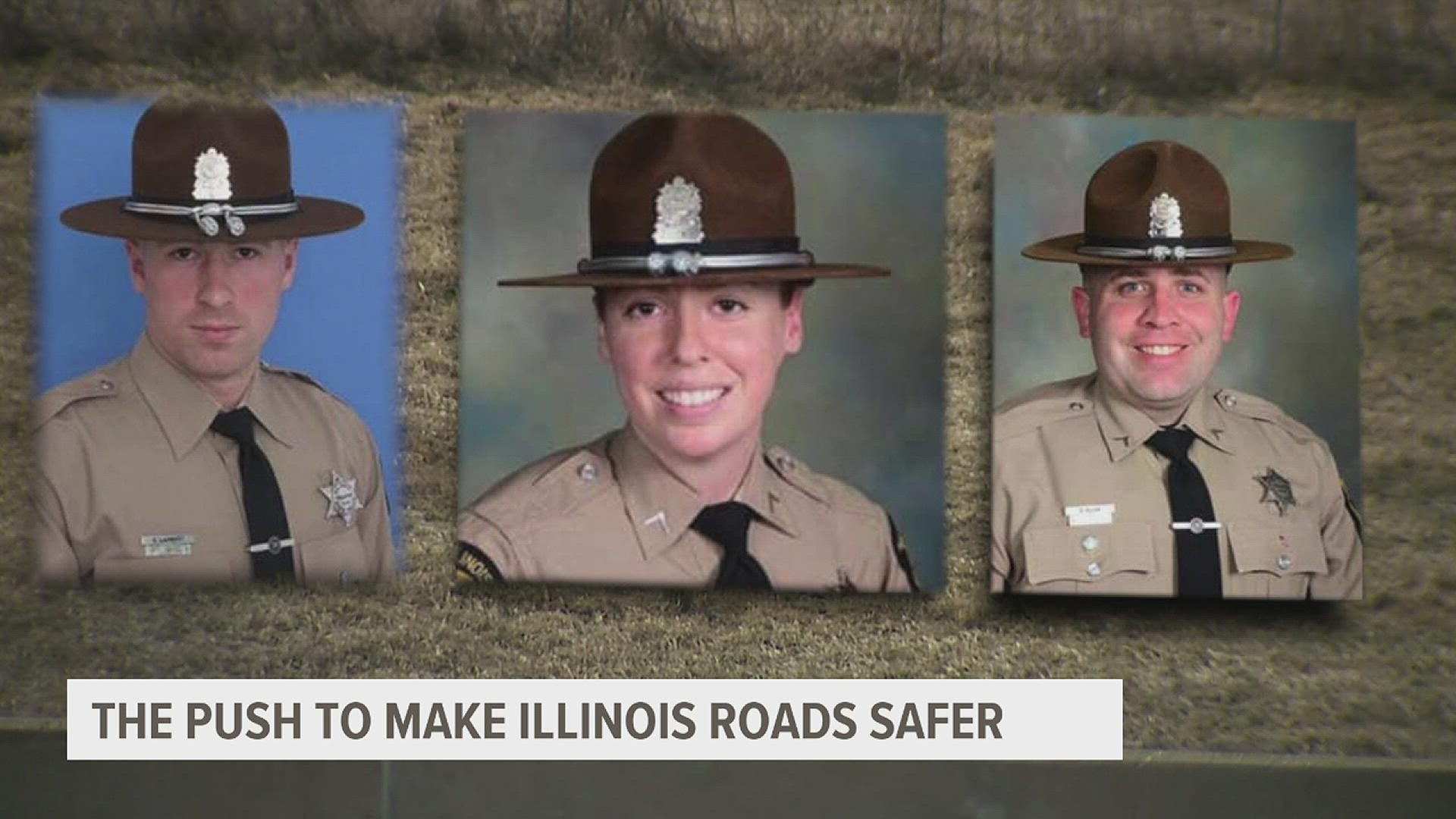CHICAGO — Illinois is beefing up its efforts to bring more awareness to Illinois' move over law known as Scott's Law following multiple deaths of troopers on the road.
Illinois State Police (ISP) Trooper Gerald "Jerry" Ellis was one of three troopers killed in the line of duty in 2019.
"He was so kind-hearted, loving and hardworking," said his wife Stacy Ellis, 35.
Stacy talked to News 8 in her first TV interview since Trooper Ellis died on March 30, 2019.
"He always wanted to be a police officer," Stacy said.
Ellis was killed by a drunk driver and the two other incidents were a direct result of Scott's Law violations.
"Jerry wasn't doing anything but driving down the road," Stacy said.
The incident happened on I-94 in Lake County, just outside of Chicago. Trooper Ellis was on duty heading home when he spotted a driver heading the wrong direction on the highway and Ellis decided to hit the driver head-on. Officials said Ellis' split-second decision saved a family in a vehicle that was traveling behind him.


"His reputation was one of a person who just had a bright disposition, who was a positive presence," said ISP Director Brendan Kelly.
According to ISP, 2019 was its deadliest year of troopers killed. Three of the four fatalities were crashes. The other was a shooting incident.
"It is frustrating," said Kelly. "It sometimes makes you very angry."
Fallen troopers Christopher Lambert and Brooke Jones-Story were the other two ISP troopers involved in the 2019 fatal crashes.


"We get Scott's Law all the time," one trooper told News 8. "There's just more and more and more of it."
Scott's Law requires drivers to move over and slow down for vehicles stopped or disabled on the side of the road. Also now in the law, it says drivers who cannot change lanes must at least slow down.
ISP launched interactive maps that shows the amount of crashes involving Scott's Law. As of April 6, ISP reported 72 Scott's Law-related crashes from 2019 to 2022.
"There's too many officers, yet today, after this law was enacted, that are still being hit," said Illinois State Representative Daniel Swanson.
Illinois lawmakers have beefed up the consequences drivers can face for breaking Scott's Law.
"What goes through my head is, 'What was going through the person's head that hit that car?'" Swanson said.
The first offense for violating Scott's Law is $250 and a second offense is $750 out of $10,000.
"It's not a complicated law, it's a very simple, straightforward law," Kelly said.
Damaging another vehicle due to a Scott's Law violation is a misdemeanor, which includes up to a year in jail and a $2,500 fine. A crash that kills or injures someone is a felony and could lead to nearly 30 years behind bars.
"There is no excuse," Swanson said. "There is no excuse for hitting that car."
In an effort to prevent impaired driving, the new federal infrastructure bill signed into law will require all new passenger vehicles to be made with technology like lane monitoring and assist cameras by 2027.
"It's not worth your life or someone else's life to drink," Stacy said.
"We are much closer to eliminating drunk driving as we know it," Kelly said.
"The law enforcement that's on the side of the road is someone's father, someone's brother, someone's mother, etc," said Lucy Kuelper, daughter of an ISP trooper who's raising awareness for Scott's Law.


Lucy is 15-years-old and from Knox County. Her father has been an Illinois trooper for almost 20 years. Following the deaths of troopers in 2019, Lucy took her mission to social media by launching the "Move Over Project." She has gained thousands of followers ever since. She is also credited for being part of the push to urge lawmakers to strengthen the penalties for Scott's Law.
Lucy has traveled around the state to speak in schools and during public events. She now hopes to work with national lawmakers to spread awareness across the country.
"On my Facebook page, I would get text messages every day," Kuelper said. "'I saw this happen, I saw this happen. My loved one was killed to this violation."'
Lucy's efforts have also helped pass legislation that teaches Scott's Law in driver's education classes.
The Illinois legislature has approved a "move over early warning system task force" that includes first responders and telecommunication workers. The group is tasked with developing an app like a Silver Warning or Amber Alert that would inform drivers of roadway hazards within a certain distance.
"The technology is there, it's just a matter of developing that particular technology so that we can apply it to this scenario," Kelly said.
The talks come as Illinois marks its 100th year of service. The agency is set to hire 300 new troopers with its largest budget in history.
"If they choose to break that law, we're going to enforce it and we're going to hold them accountable for it," Kelly said.


Trooper Ellis was 36-years-old. He served 11 years with Illinois State Police District 15 in Downers Grove. He was also a veteran of the U.S. Army and graduated from Western Illinois University. Ellis was from the Macomb area. He leaves behind his wife of 10 years and two young daughters Zoe, 8, and Kayle, 10.
"The girls always know they can talk to him and see his pictures. They're just like him. They remind me of him a lot," Stacy said.
Police said the 44-year-old driver, who killed Trooper Ellis, also died in the crash with a blood-alcohol level of .169, more than twice the legal limit. Police said the man had no insurance or valid driver’s license since 1996 and had prior DUIs.

